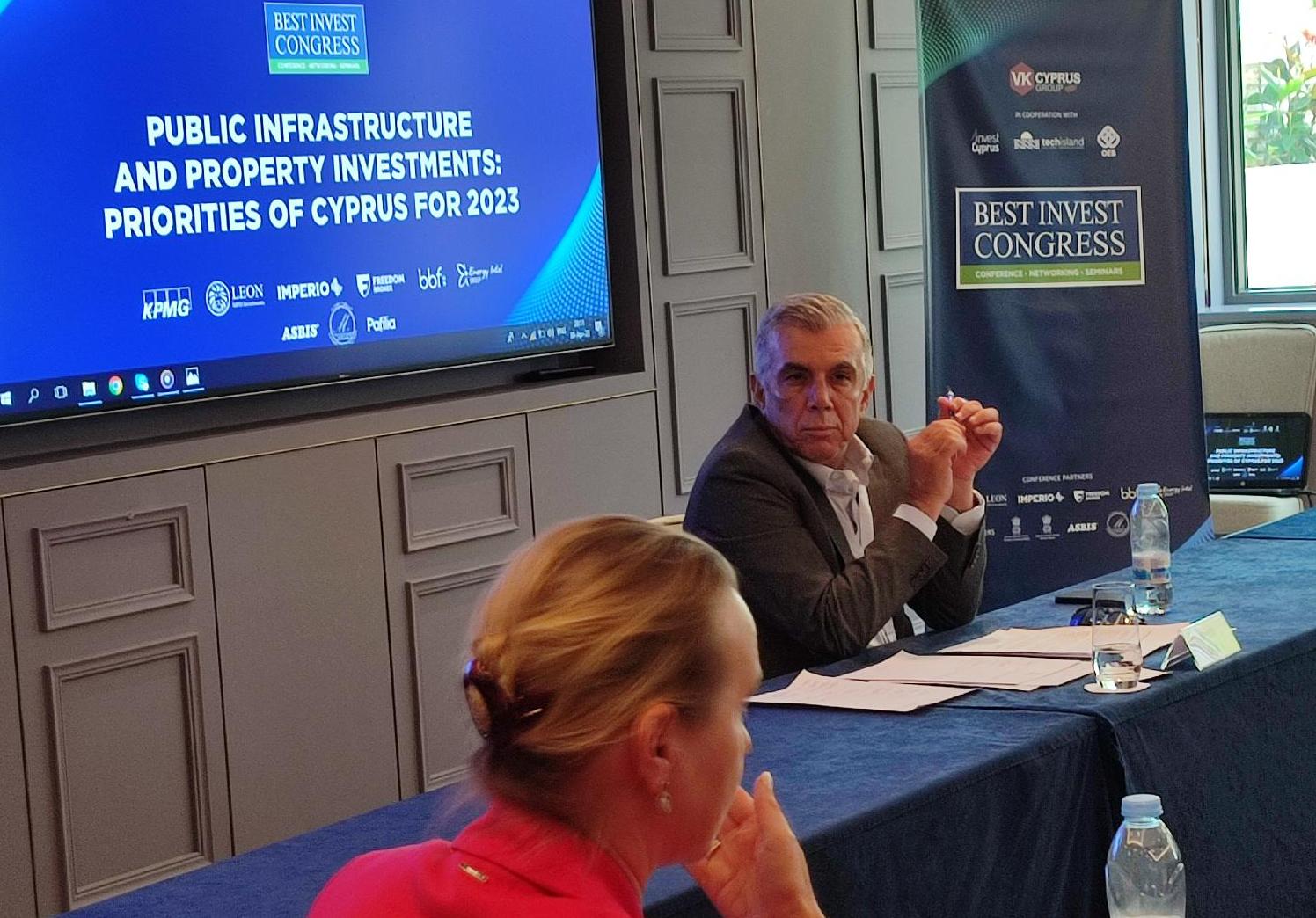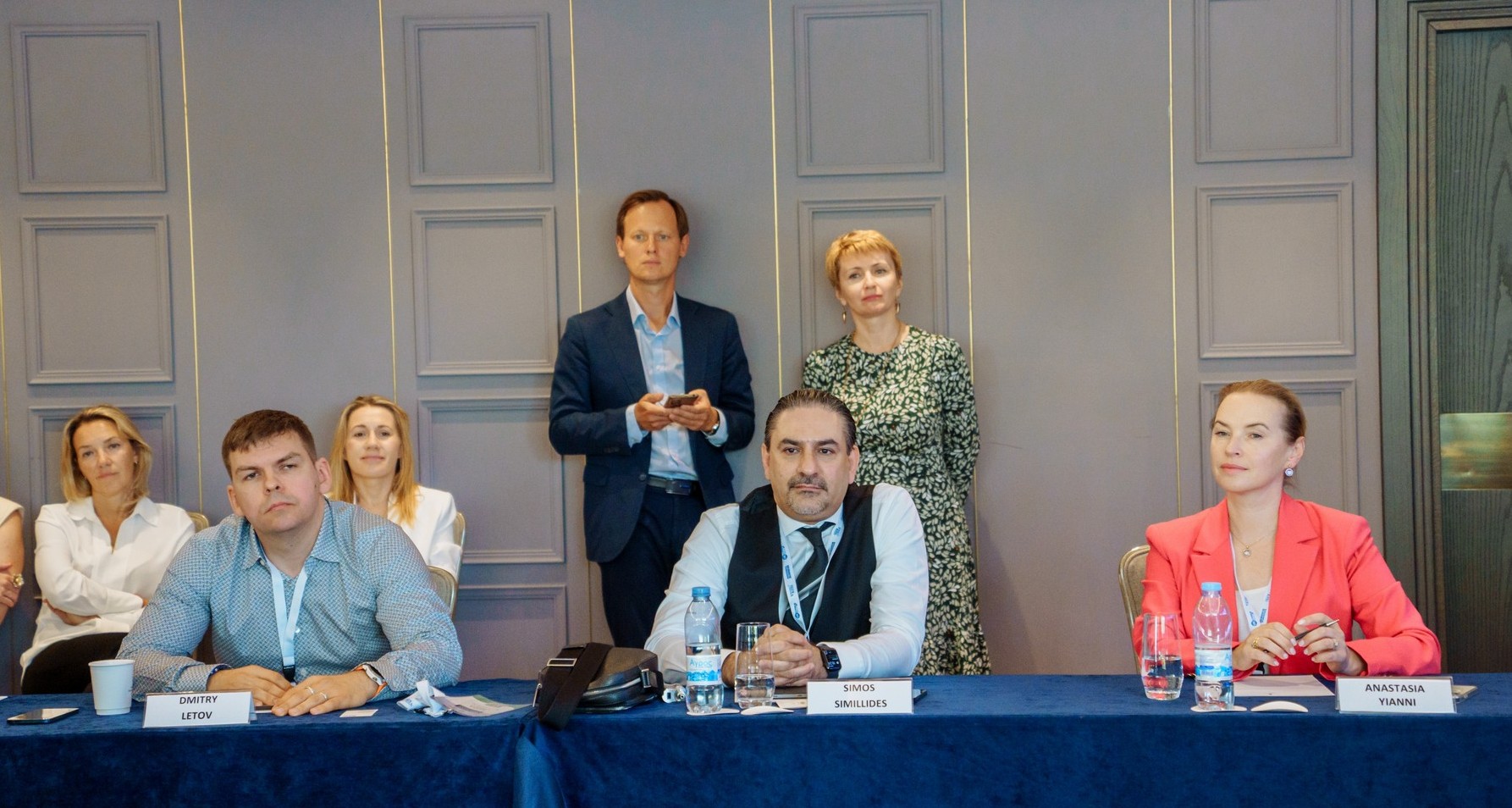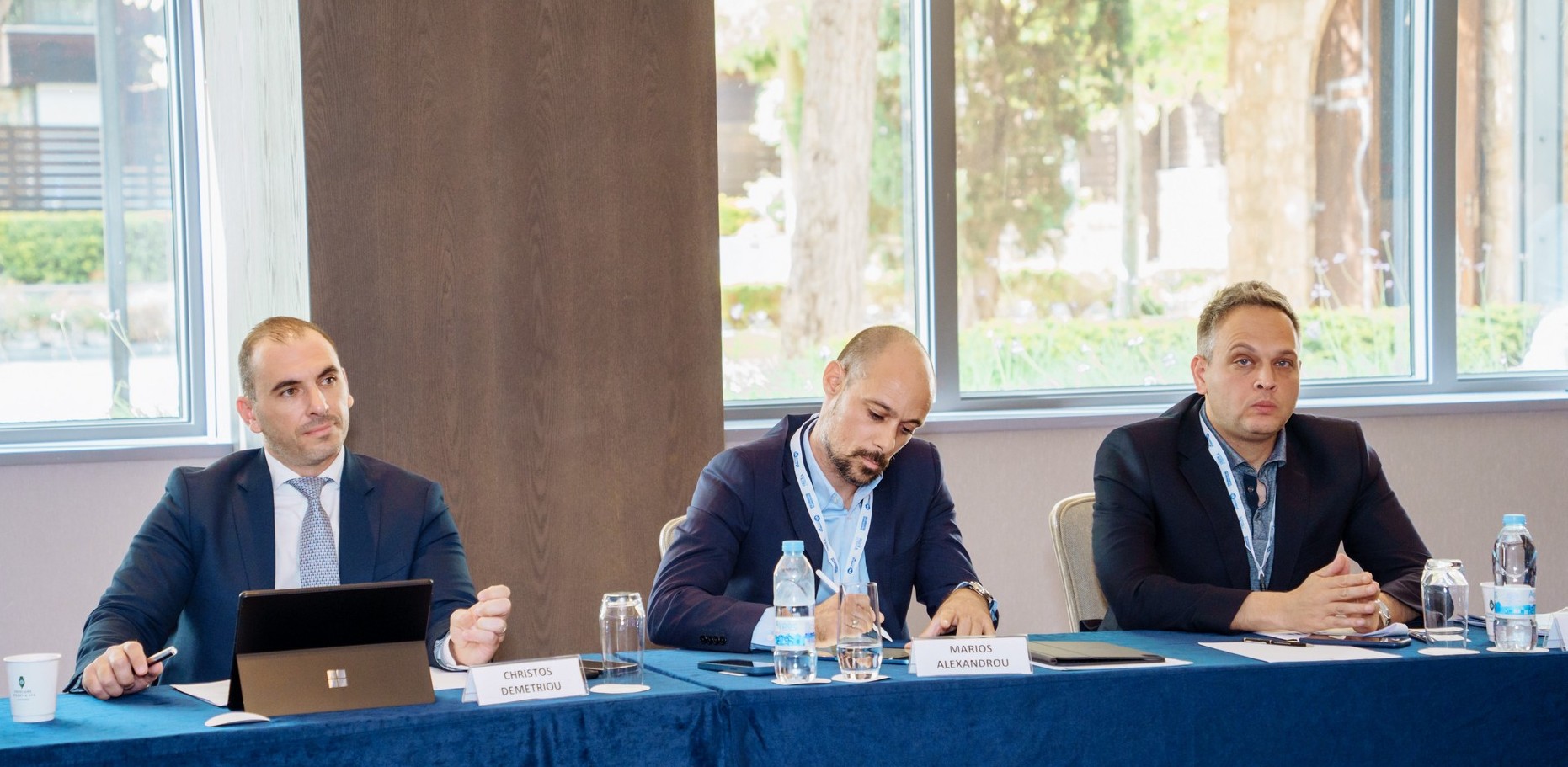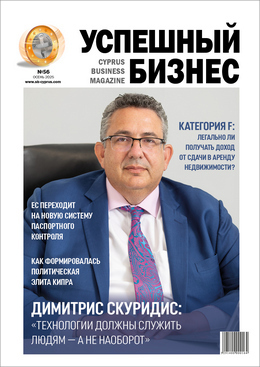The accelerated growth in Cyprus since COVID, has taken everyone by surprise across all industries which resulted in putting a big toll on infrastructure. Despite the on-going geopolitical factors, there is still growth opportunities in Cyprus – «The Future of Cyprus is Even Better!» George Dokuchaev, one of the panellists from bbf, enthusiastically commented.
This session has ignited an interesting dialogue around the areas of energy, commercial and residential industry, schooling, healthcare, and digitalisation.
The panel was moderated by Spyros Spyrou, Group Managing Director, ASG Group.
The panellists included experts in their industry: Marios Alexandrou, COO of Energyintel, Christos Demetriou, Business Development Director, Imperio, George Dokuchaev, Sales Director, bbf (Prime Property Group), Dmitry Letov, Head of Construction Exness, Simos Simillides, Commercial Director, Pafilia Property Developers and Anastasia Yianni, CEO Cyprus Sotheby’s International Realty.
Spyros Spyrou opened the discussion by sharing an example relating to his own business when many years ago he negotiated a €5 per square meter for his business property and now his landlord has renegotiated the rate to €20 per square metre. He based this cost on the fact that the West side of Limassol was still cheaper than the East side and said that this was a moderate increase. George Dokuchaev agreed with this comment and Spyros Spyrou pointed out that from his example, we can all see that demand is growing faster than the supply.
Spyros Spyrou invited the panellists to share their views and whether this was sustainable. Anastasia Yianni agreed with this statement that we can now see more sustainable demand, thanks to companies such as Exness, who actually bring the end users to the property market. If this continued, then it would be sustainable. Previously she stated, we had lots of demand, however, people did not need the property.
George Dokuchaev added, the Cyprus Nicosia and Limassol offices market had evolved from offshore offices for having a legal address only, and then substance came along and increased the criteria by having a physical office. Now people want to relocate and work from here. It has been like this since 2016 when the government introduced the new incentives for predominantly High-Tech Companies.
Spyros Spyrou also added, the Ukrainian conflict had attracted more people to come to Cyprus. George Dokuchaev pointed out the structure of demand was the same, however, now multiplied. Spyros Spyrou commented that this has driven rents to increase dramatically. Simos Simillides then added that a lot of people outside from this room did not understand, the Real Estate industry developing is not a very agile industry, and to be more specific, the government very rightly introduced the headquartering incentives which in a way was aimed to enhance the FDIs in Cyprus. However, this created an over-demand for office space, accommodation for employees, schooling, and healthcare.

Simos Simillides commented «To build a new development to accommodate all these demands, it usually takes 2 years to conduct studies, submit plans to the authorities and get planning licenses. The industry is now reaping all those inefficiencies in the rest of the government authorities that cannot implement quickly enough the developer requirements to introduce a new product into the market. In a way, we have companies that are calling us to say they want to relocate to Cyprus and bring 100 employees and are asking where they will reside and which school their families can attend. Nobody has the answer for this.»
Christos Demetriou mentioned «Limassol has an organic growth. Basically, population grew the past 5-8 years, and with an intermittent like the pandemic pushed developers to freeze construction, then we had a big inflow of population – the ratio of people coming in and construction are very much tipped to the population growth which contributed to the unbalance now between supply and demand. Of course, on a positive note, indeed this growth has been organic, where you have this population coming here with the purpose of staying permanently and now we are discussing tech, like Exness, and going forward we have many things to see where headquartering is not just limited to Tech companies, we still have not seen energy where we will see many changes there in the near future, and of course other major attractions like golf courses, the “City of Dreams” and other new companies coming to Limassol.» Limassol has been the one city most prepared with upgrading their infrastructure, however, it was not prepared enough, and Simos Simillides agreed. He added that yes, we needed to move faster, and infrastructure was needed in residential and commercial properties, in healthcare, schools, public infrastructure and this took time. Tech moves very fast, and he is confident we are moving towards the right direction.
Spyros Spyrou added «The benefits of Cyprus are big, and we want investment and development to continue and for this to happen we need to solve the issues which create opportunities.» Spyros Spyrou invited Dmitri Letov to provide his views from the user’s point of view. Dmitri went on to say «The past year has seen an increase in IT companies moving to Cyprus and it has changed the face of infrastructure with the lack of schools, lack of accommodation, lack of offices etc. For us and for other IT companies this is a big problem and a problem for Cyprus. Each new person that comes to Cyprus creates a new workplace such as shops etc. The downside which we now see, is that people are moving here without the market being fully prepared. The rental prices and in general real estate prices have increased. The problem now is that rental is no longer affordable especially for people who have been living here including the locals.
Sryros Spyrou commented it is certainly getting more expensive for those wanting to relocate to Cyprus.
Dmitry Letov then continued speaking about a business topic relating to real estate and commented that we should always see the opportunity and not the problem. «We are now implementing a new niche business model to create a a “build to rent” product. The aim is to develop properties specifically for rent not for sale and the way we see it; it will be very beneficial for developers. The increase of companies moving to Cyprus will bring more people to the island to live here. The demand for property will grow, ordinary IT employees cannot afford to buy an apartment, however, they can afford to rent. That is why if we create these affordable apartments, for those who relocate and for local citizens, it basically solves the problem for accommodation. Dmitry Letov made it clear that they were not moving into the development space. Recently they made several transactions with local developers, of hundred units which they bought and are now specifically developed for them. Dmitry Letov added «We are now working on other partnerships, and we truly believe this is a good opportunity for developers. But I need to say, definitely the difference between “build to rent” and “build to sell” for the sake of developers is favourable. When you “build to sell” developers develop the property for sale, and it is quick money. When they “build to rent”, they use the funds by selling as collateral, they get a loan, re-invest, and create a portfolio to enjoy the capital appreciation. Companies like us – other IT companies and institutional funds come to buy-out those portfolios of rental properties to generate business. This model is not common for Cyprus yet, but it works everywhere else. In the European Union the past couple of years, several companies introduced incentives specifically for the rent business. We truly believe it is a great opportunity. Exness wants to develop around 2,000 apartments making it more affordable for everyone to rent.»
Spyros Spyrou recapped «We expect the demand to grow gradually at some pace but expect supply to grow faster, which will make the current challenges easier to face them. Could we say this is a conclusion and everyone disagreed». Simos Simillides commented that supply is very high. Marios Alexandrou also agreed that there is certainly growth. Growth means at the same time, we need infrastructure. Infrastructure includes transportation and in particular energy. Energy demand will grow if population is growing double, so the question here is «Do we have electricity to cover this demand or are we going to have to cover our own demand?» Marios Alexandrou added «I have seen that bbf and Imperio are adding voltaics to their developments, which is excellent news. There is still lots to be done in a sense of clean, green energy in transportation. We have seen more and more electric cars coming into the market – do we have a demand here? Will Tech companies settle for moving into buildings that we have today? Do they need more solar – storage wise? This is a big subject.»
Christos Demetriou, agreed with Marios Alexandrou and added that sustainability is within their core strategy at Imperio and the first question to ask, is “how do we start overcoming creating the potential making Limassol more attractive? «I mention Limassol as this is what the major issue is faced right now. In this case, the biggest driver would be large-scaled developments in a sense of multi-concept, live; work; wellness; enjoyment. There are many benefits in these developments that would also include sustainability. But first, we need to address the demand which is mid-market residential with workspaces. Working from home or hybrid models is already a reality in big number of industries. It is an increasing trend even more so after the pandemic, to create large scale projects which include big residencies and co-working areas and business centres. This model also relieves the traffic congestion, and they make day-to-day commuting much easier. Another important aspect is decentralizing a lot of people, because usually these projects are at the surroundings of the city. So, it will relieve a lot of traffic and it will be easier for public authorities and for infrastructure to be better planned, because you have the opportunity to develop new areas and new infrastructure, taking into consideration sustainability which has multiple benefits both for the owners, users and for the investors and manage the demand issue, if they address the needs of the market.»
Anastasia Yianni added that unfortunately this is not just an issue with Limassol. It is also a Pan-Cyprian issue, with the lack of space and infrastructure and even though large scale developments are amazing, in reality not all developers can follow this concept. Anastasia Yianni added «We need to come back with better planning from the authorities. We have examples where we needed more schooling and within months, a temporary structure was created to accommodate the needs, at the same time, we do not have enough foreign teachers and the fact that permits take a long time – due to lack of IT support, the situation becomes very complicated. Our clients do not want to put their kids into the Greek education system so there is a need for better urban authorities planning.»

Simos Simillides added «Cyprus is changing and to take the words from Marios, it is transforming. It has all the advantages to do so, as it is a beautiful destination, crime free. The weather is amazing, the location is great, and it has all those things to enable Cyprus become truly a relocation paradise. But for this transformation to take place, a lot of parallel things need to happen as already mentioned above. Another aspect already mentioned by Dmitry, is the issue of the banking and loans. A few days ago, I was looking at KPMG numbers and it showed in 2022, only 1,100 mortgages were approved, at the same time, the residential industry in Cyprus in 2022 was valued at 3.8Billion Euros so it does not make sense with this low rate of mortgage approvals. Basically, if people do not have the money to pay upfront and the banks are not lending to alleviate this problem then you have an issue all by itself.»
Simos continued «I would also like to add to what Christos mentioned earlier. Large scale developments are one of the ways forward. Just to give you one example from our company. We have Minthis, which is a golf resort in Paphos. As part of the conditions to get the planning and building permits, we had to give back to the community. We had to build a sports centre, 8 tennis courts, soccer courts – something for the community adding to the infrastructure of the area. Yes, I agree with Anastasia not all developers would be able to maintain these large-scale developments, however, the solution the government should give, is to introduce “give back to the community” projects in order to approve large developments.»
Marios Alexandrou added «As we all come from the private sector, the biggest shortage in support we have here in Cyprus is from governmental support. Let’s not hide the situation under the carpet. Everyone here has the responsibility to push the government and IT companies like Exness, could push the government towards digital transformation and this will support getting permits faster.»
George Dokuchaev added to this point « We must be real what the government can do, when we have ups and downs plus -30%. When we look at the statistical data is enormous, last year’s numbers 20-21 plus 30%, tourism -40%, it is very hard for the government to act upon this. It is very swift and changes daily. I want to be the adult here and mention that people are quick to criticise the Cyprus government. We need to look at the other governments in the world. I did my research where I saw a list of government projects such as the financing of fibre where they will spend 200m Euros this year to improve the speed of the internet and according to a study which I found from an American consultant; the speed of the internet increases the price of real estate. Apart from that, the government agreed to open the Casino and we will see a boom in the real estate industry. The best-selling project is located next to the Casino. The government is also financing a motorway to link Palodia to the mountains. Looking into the energy projects, they closed the refinery in Larnaca to create a new neighbourhood which will be people-friendly, and this has changed to real estate of Larnaca, so I think the government is doing a great job.»
Dmitry Letov, agreed with Chris and George’s views and added «If you look from the international experience definitely large-scale development projects allow to create better environments for residents. However, we need to see how to solve the infrastructure and in particular the transport issue. My personal feeling the transport will be a major issue for the next 5 years especially in Limassol as there is no centralised alignment. To solve that we may look at public transport which private sector cannot support. In other cities around the world, people have switched to public transport, scooters, or bicycles etc. It is a combination of measures. For us, the usage of scooters is very efficient.»
Spyros Spyrou also added his expertise and mentioned car sharing was something they developed and tested during the pandemic where they had cars available and then added with Exness presence, this helped his business to scale.
Dmitry Letov, continued by saying that currently legislation does not incentivise and motivate people to use a scooter as there are no dedicated scooter lanes.
Spyros Spyrou then reiterated that Cyprus is changing and transforming « My question is, the private sector is changing even if developers are not ready for large-scale development they will adjust. We have also adjusted the car mobility. He asked the question «Does the government adjust fast enough? As an example, the municipality of Limassol was used to examine applications for smaller residencies, are our authorities ready for this transformation?»
Christos Demetriou, mentioned that in the past 3-4 years there were challenges «I believe we are moving forward, and with this new administration, they will continue making improvements.»
Spyros Spyrou commented «We need two types of changes to allow the country to continue developing, one is to develop its infrastructure and we talked about energy, transportation, mobility, real estate, education, healthcare, and digitalization, and the other is the relationship of the state with the private sector. I want to come back to energy, which is a requirement from the European Union and Cyprus is lacking the investment that it needs to improve. What would be the right framework for private investment in the field?»
Marios Alexandrou commented, that we first needed to see the current situation and then look at what needed to be done to make improvements. «Electricity Authority of Cyprus is the dominant electricity producer for the whole island. We burn fuel to cover 82% of our needs, and the rest is solar plus wind turbines. The demand is growing faster than what we have in place. Meaning the solar project that needs to be developed is very slowly in the development process. The generators which are fuel burning should be phased out. If the government does not react quickly with the licensing etc., we will be facing a problem of energy supply. I am not sure if you have noticed, recently we have had some power cuts. It is small but it gives you an overview what could happen. Spyros Spyrou wanted to understand «Could the government apart from investing in some infrastructure, create some incentives for the private investments in the field that would help phase this issue?»
Marios Alexandrou responded «To be 100% transparent and correct, they do! They have said they would implement a one stop shop to accelerate the process of licensing for energy projects. It is there, it just has not kicked in as yet, however, it is coming. At the same time, the need to provide incentives with the same way that they did with real estate to attract people to invest, needs to be implemented in the renewable energy sector also. We are talking about renewable; we are not talking about anything else. Everyone knows the pace and the way to move forward, is to invest more in renewable energy to cover our needs.»
Spyros Spyrou questioned if major players such as in the real estate and IT industry could be part of the solution to solve the problem? Marios Alexandrou responded by saying yes, they could be part of the solution for sure. «Developing apartments and houses and other buildings that need electricity at the same time, in parallel these investors need to build the renewable energy infrastructure that would cover the demand. There are several solutions to utilise the space when adding solar panels such as parking spaces, shading areas etc. As an example, we recently used a building façade to place the panels and it was more cost-effective to use photovoltaics to create shading than the actual shading structure.»
George Dokuchaev added that it is a very cost-effective solution, and it pays back. Developers are incentivised to use renewable energy to a maximum.
Marios Alexandrou commented to George that incentivised is one thing and another thing is implementing the solutions where your assets are having a much higher value.
George commented that «We are now seeing people coming from places like Germany and the demand is pushing developers to that direction.»

Christos Demetriou added that the market is quite premature with regard to sustainability and there is not much knowledge of what the benefits are, and we needed to inform investors and buyers that besides reducing environmental foot print, the end-users have the benefit of lower energy costs, investors also get a lot of benefits because having invested in a sustainable asset vs conventional asset potentially they get higher yields on one side and higher value of appreciation because this is where the market is moving globally.
Simos Simillides questioned whether Cyprus was still paying fines for not moving faster into the renewable sector and Marios Alexandrou confirmed that Cyprus still paid annually a fine of 300 million Euros.
With regard to investors in this sector, Marios Alexandrou mentioned that majority of investors came from the real estate sector and international funds who wanted to invest in renewable energy here in Cyprus.
Spyros Spyrou asked «What is keeping us behind as a country? Is it infrastructure instability?» Marios Alexandrou responded by saying that the National Grid had inefficiencies, with a need to be developed in a smarter way. «The government can apply for subsidy from the EU to support the development of a faster and more effective grid. I believe investors could take on this initiative, when we are building our solar plants and we provide the storage as well as providing the solution for the grid shifting the energy at the time when it is needed.»
Spyros Spyrou reiterated that part of the solution is investing in energy storage and Marios Alexandrou confirmed it is the main part of the solution.
Spyros Spyrou closed the panel by recapping the main points «The future is bright, the economy is going to continue growing, demand for property and office space will continue and to avoid big problems we also need to invest in infrastructure to not only support the facilities but also to support human capital, transportation, mobility, education, healthcare, and technology.»
Spyros invited the panellists to add their closing comments. Anastasia added «We are all happy to see that people are still coming and Cyprus being a very clever and creative place, no doubt will find solutions, hopefully sooner than later in order to attract those who come to Cyprus to stay permanently. We need to concentrate on Cyprus being a great place to live for the end user.»
Simos Simillides, commented «Cyprus has all the natural advantages to be one of the best destinations for living and other countries with less natural characteristics like ours are advertising, implementing, and reaching out to people. To continue from what Anastasia said, yes there is a growing demand for people to relocate and live here in Cyprus and be part of the community and these people need the infrastructure to support them, make their lives better and that should be one of the major focus not only on the private sector and most importantly on the public sector.
Dmitry Letov agreed with what has been said and added that Cyprus had a potential to become a big IT and Tech hub. What we needed to implement here is a dialogue between the public and private sector, perhaps create a forum where both sides can openly discuss challenges and brainstorm ideas on how various issues can be fixed.
George Dokuchaev added «We need to tackle the issue of immigration, getting passports and visas faster. Last year 20,000 people arrived in Cyprus, and we are seeing a lot of backlogs. The private sector is better at building infrastructure; however, the government needs to take onboard the heavier projects such as building roads, expanding airports etc. In addition, the government needs to start authorising permits faster so developers can keep up with the demand of starting new projects. It is very strange that in 2019 the government authorised more permits than today. The demand now is much higher than then. Also, there is no dialogue as we are dealing with the small guys in the front office. We do not have access to the decision makers, and it would be beneficial for the private sector to develop relationships with them.»
Marios Alexandrou agreed with everyone with emphasis of the importance of developing an open dialogue with the government.
Christos Demetriou fully agreed with everyone and is very optimistic, even though we have a few bumps to overcome along the way.
Spyros Spyrou highlighted, that very clear messages have come up in this panel discussion with urgent challenges that needed to be addressed and with that, he thanked the panellists and everyone for their attendance.







